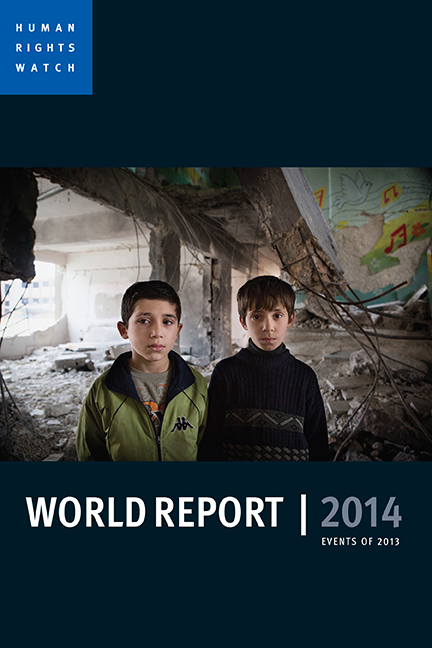Book contents
- Frontmatter
- Dedication
- HUMAN RIGHTS WATCH
- Table of Contents
- Foreword
- Rights Struggles of 2013: Stopping Mass Atrocities, Majority Bullying, and Abusive Counterterrorism
- The Human Rights Case for Drug Reform How Drug Criminalization Destroys Lives, Feeds Abuses, and Subverts the Rule of Law
- Putting Development to Rights: Integrating Rights into a Post-2015 Agenda
- The Right Whose Time Has Come (Again) Privacy in the Age of Surveillance
- Photo Essays
- AFRICA
- AMERICAS
- ASIA
- EUROPE AND CENTRAL ASIA
- MIDDLE EAST AND NORTH AFRICA
- UNITED STATES AND CANADA
- 2013 HUMAN RIGHTS WATCH PUBLICATIONS
- Acknowledgments
- Frontmatter
- Dedication
- HUMAN RIGHTS WATCH
- Table of Contents
- Foreword
- Rights Struggles of 2013: Stopping Mass Atrocities, Majority Bullying, and Abusive Counterterrorism
- The Human Rights Case for Drug Reform How Drug Criminalization Destroys Lives, Feeds Abuses, and Subverts the Rule of Law
- Putting Development to Rights: Integrating Rights into a Post-2015 Agenda
- The Right Whose Time Has Come (Again) Privacy in the Age of Surveillance
- Photo Essays
- AFRICA
- AMERICAS
- ASIA
- EUROPE AND CENTRAL ASIA
- MIDDLE EAST AND NORTH AFRICA
- UNITED STATES AND CANADA
- 2013 HUMAN RIGHTS WATCH PUBLICATIONS
- Acknowledgments
Summary
Kenya's closely contested presidential election in March resulted in the election of President Uhuru Kenyatta and Deputy President William Ruto, after the Supreme Court rejected an opposition challenge. Both Kenyatta and Ruto face crimes against humanity charges at the International Criminal Court (ICC) for their alleged roles in post-election violence in 2007-2008.
Fears that the 2013 election would spark a repeat of the widespread violence of 2007-2008 did not materialize, but the run-up to the elections was marred by pockets of ethnic and political violence, and police used excessive force to disperse protests in Kisumu.
The slow pace of police reform, the lack of accountability for security force abuses— including extrajudicial killings, torture, and other human rights violations by the police— and the government's failure to hold accountable perpetrators of the 2007–2008 post-election violence remain key concerns.
The September 21 attack on Nairobi's Westgate mall killed at least 67 people and highlighted the security threat posed by the militant Islamist Somali group Al-Shabaab both within Somalia and in Kenya, which hosts an estimated 500,000 Somali refugees. The Somali refugee community has frequently been subjected to discrimination and reprisals in the wake of attacks in Kenya, including a brutal police operation from November 2012 to January 2013 in Nairobi's Eastleigh neighborhood. The community did not immediately report reprisals following the attack on Westgate mall, but there were reports of arbitrary arrests and extortion by the police in the Eastleigh area of Nairobi in October and November.
Lack of Accountability and the ICC
President Kenyatta, his deputy Ruto, and former radio journalist Joshua arap Sang are facing charges of crimes against humanity at the International Criminal Court (ICC) for their alleged roles in the 2007-2008 post-election violence. Ruto and Sang's trial began in September, while Kenyatta's trial is now expected to start in February 2014.
Kenya pledged to continue cooperating with the ICC, but since the election, the new government has actively campaigned at the United Nations and the African Union (AU) to have the cases dropped, deferred, or referred to a local justice mechanism. In September, the National Assembly and the Senate approved a motion calling on the Kenyan government to withdraw from the Rome Statute, the treaty establishing the ICC, which Kenya signed in 2005.
- Type
- Chapter
- Information
- World Report 2014Events of 2013, pp. 129 - 135Publisher: Bristol University PressPrint publication year: 2014



